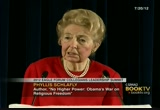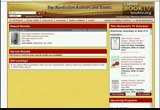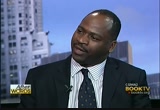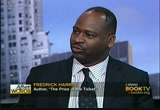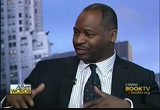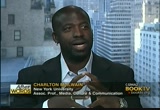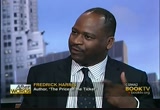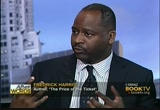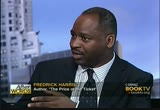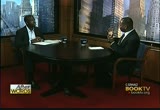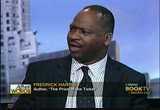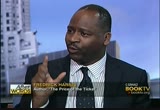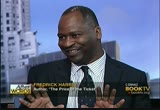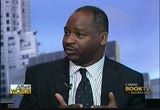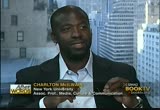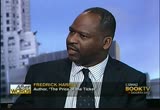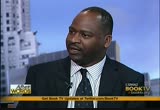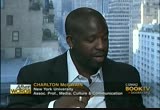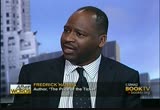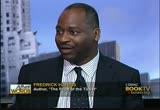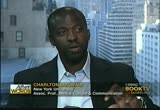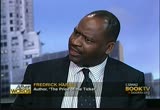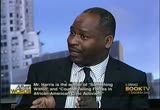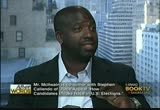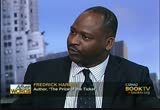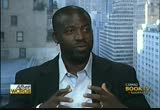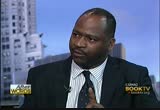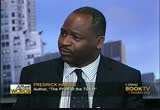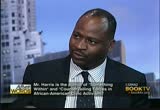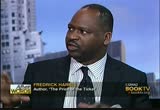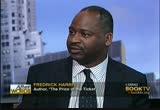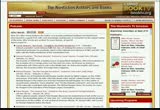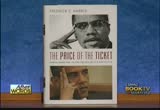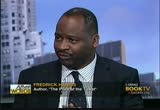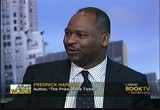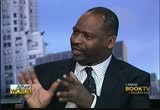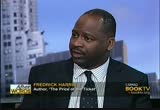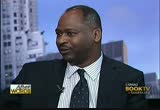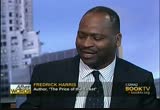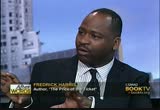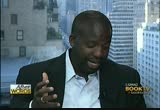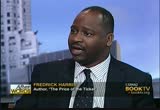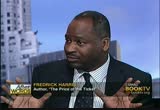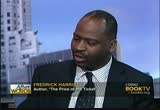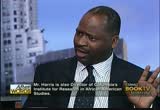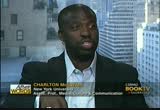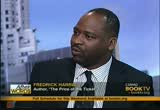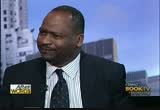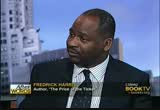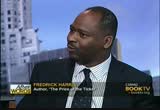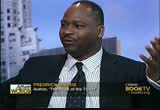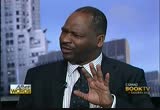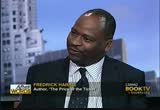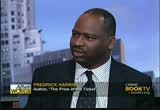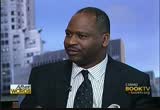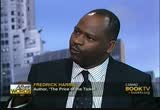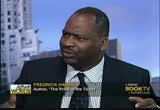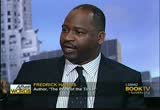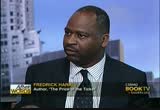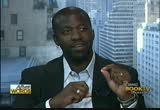tv Book TV After Words CSPAN July 29, 2012 9:00pm-10:00pm EDT
9:00 pm
god bless america up. pledge allegiance.ce. pledge allegiance. the renault's with the powerdent of the president is to appoint judges if he appoints a elena kagan thatthatw will control the country over the next 50 years. we cannot afford that. are you ready for the election? [laughter] [applause] . .
9:01 pm
9:02 pm
what it's about is an examination of black politics in the age of obama, and one of the curiosities that really motivated me to write this book is actually a piece that was written in the "new york times" magazine during the summer of 2008, and the title of the article was the "end of black politics," and it provided this general explanation about why is it that you see this crop of black politicians who are running in political campaigns, and so for someone who was writing on the issues for more than a decade, i think i wanted to have my say, and so in this book, what it's really about is providing a historical cop -- context to the rise of barack obama looking at the strategies that rationally neutral black politicians have been using and talk about the consequences of the strategies for present day
9:03 pm
black politics. >> host: okay. so you'd say it's more than about obama, though? he's the central figure -- >> guest: yeah. it's a way lot more. i think history is very important to figuring out what's going on at the moment, and so not only it's about grounding the rise of obama, but within history i talk about the jesse jackson campaigns, chicago politics back in 1928 with the first blank -- black congressman coming from the southside of chicago. i talk about ideological fishers around liberation, theology, prosperity, gospel, and this long history about the politics of respectability. looking at -- the need of black elites to raise up what i describe as the untalented nine-tenths within the black community to present a positive
9:04 pm
face to america, white america, about racial progress. the rise of obama is within all of these contexts. to sort of explain the 2008 race and what obama did as a candidate, particularly when he faced issues of race, it has to be anchored in these trends, these ideological trends developing within the black community and the history with the rise of his campaign came out of. >> got you. tell me a little before you get into the details of the book that you spell out nicely there, and we'll touch on most of those. tell me a little bit about what it was like to write the book, do the research for it. you make note that you're a political scientists, and often we're stuck in our numbers, stats, and in the present context. what was it like for you to look back in the historical context?
9:05 pm
>> guest: right. that's an excellent question because this was a very different book for me to write. i'm pretty much conventional political scientist. you know, i run statistical models. i do survey work. i may do a little others here and there as i did in my first book on the black church, but basically i'm looking for statistical rigor and theological contributions, but i really felt in many ways that the work that i've done hasn't really spoken directly to the issues that i think are important to black politics, and i think it's really crucial at this moment, but because i think there's a lot of am amnesia goig on about what those political struggles met for black communities, and so it was up spiring -- inspiring in many ways and fun to go back and think back
9:06 pm
decades before and delve into the history, put together interesting characters in places like chicago, and there's plenty of characters that i wrote about and couldn't because i didn't have the space, and so it was just a really fun book to do, and it really got me out of the normal, political sort of normal neutral political scientist. >> host: great. all right. let's start at the beginning. chapter one, you talk about this idea of the class. >> guest: uh-huh. >> host: tell us what that is. what is the primary distinction or fissuer in black politics spelled out in the chapter? >> guest: it's not just black politics, but especially black electorat politics. we have voting rights and the voting rights bill, black spokes
9:07 pm
people talked about what their vision of what black people in politics should look like. on one side there's malcolm x in the famous speech and black voters shouldn't be taken for granted and there should be basically community-centered issues no matter what the color of the politician is, and those politicians should be held accountable based on what they did or did not do in the interest of the community. on the other side, you had a more coalition focus perspective there was a famous essay written in the 1960s "from protest to politics," and he was trying to steer the protest movement into electoral politics as a part of black voters becoming a part of the democratic party coalition
9:08 pm
from southern voters coming in and northern black voters who already were electorally active within the political party. that vision of coalition politics included the idea that issues, concerns should be, in many ways, a universal perspective in that blacks showrld join coalitions with labor movements, with sympathetic whites, liberal religious organizations to provide policies that would be very important, not that he gave up on sort of anti-discrimination legislation and didn't see the importance of that, but this has been the big clash, and this clash, as we see it in this first chapter is in many ways crystallized in 1972. there's tensions between the independent black politics and the coalition focus because, you know, she announces her campaign
9:09 pm
in brooklyn at a church. i'm not the candidate of black folk. i'm not the candidate of women. i'm proud to be both. i'm here to serve the interest of the people. she was thinking in coalition terms, but when she -- she didn't do very, very well. >> host: interrupting for a moment. >> guest: sure. >> host: one of the things that immediately catches my eye in the chapter is that back story so take us back to 1971, chicago hotel room where this meeting convenes. >> guest: right, right. this is a fascinating story. it's almost like a mystery movie. what you have is the secret meeting that happens in chicago. you know, 1971, and you have black elected officials, mayor hatcher out of gary, indiana, first major american city, part of the bond, percy sudden, a
9:10 pm
staple in new york city black politics, and over hundred black elected officials meet outside of near o'hare airport. there's people ducking in elevators, and they are going there to deliberate on the need to run an african-american for president. there's some people who are opposed to. there's some people for it. some think there's a better strategy, pick the most liberal and viable white candidate who will be accountable to the black community if he is elected. there's some saying, no, jesse jackson, 1971 who says, no, we should run a black candidate, and you know, and then we know that person's going to win, but we want to use the votes, the
9:11 pm
delegates that are accumulated as leverage in the community so we can get, you know, patronage, you know, get policy issues that are important to us, and so all of this leads to the next summer in 1972 to the national black political convention in gary, indiana where you have black delegates for black political convention negotiates policy conditions, some are universal policies like health care, and, you know, there's a famous speech, nation time is nation time, and so you have to have a grass roots effort to place issues on natural politics, and so what we have here is shirley chism who doesn't go to the
9:12 pm
meeting at the airport or near it rather, but she just jumps in herself. >> host: no one else was selected? >> guest: they couldn't come up with a candidate. there was also questions about brokering. people have particular interests by going with the political candidate because they might personally benefit from their association. there was a lot of brokering going on, but shirley hopscotched over that saying when she announced she was running, she did it. some people opposed her, particularly the men who were very sexist, black politicians in particular who thought a black man should be the first to run in a democratic primary. >> host: right. >> guest: but there's lessons learned from that experience, and she talked about those, and that laid the foundation for jesse jackson's campaign and jackson's campaign, i argue,
9:13 pm
laid the foundation 20 years later for president obama. >> host: great. that's a little about what i want to ask you about. shirley, an aspiring figure, but when you look at it in i terms f typical measures, political success. she ran with no sanction from the black elite. >> guest: right. >> host: she was unable to get very many black delegates. when she tried after humphries released the delegation at the convention and tried another play to amass delegates, she was unsuccessful there. >> guest: right. >> host: and ultimately, she was unable to translate any of that into tangible gains or leverage in the democratic party nominee that year so by all accounts she was a failure. tell me why it is her candidacy
9:14 pm
was central and why it paveed -- paved the way and why it was essential to president obama. >> guest: uh-huh. that engaged african-americans for the first time, it gave experience in presidential politics. >> host: right, okay. >> guest: these players in the background, especially jackson who seems to crop up at key moments and in civil rights black history, but it gave them experience. they kind of knew how things were. they learned from the failures of that experience. what also as shirley said herself in her memoir she wrote published a year later was that she was the first. not only the first african-american, but the first woman, and it's of disappointment in many ways that in 2008 when we had, for the
9:15 pm
first time, a viable woman running for president and a viable african-american running for president, shirley was hardly mentioned by the media, the candidates themselves, but despite that, she was the first. she took the sexism that came at her on the chin as well as racism. she like president obama and jesse jackson, and i didn't talk about it in the book, but she talked about it in her memoir, is her life was threatenedded because he was running, and, in fact, wallace was shot. she came to his side to offer comfort although ideologically they were on opposite ends. i think, you know, there always has to be a first; right? people attempted before jackie robertson was integrated; right? so we also forget those who
9:16 pm
paveed the way making the road easier for those to come. >> host: a sacrifice for her. >> guest: sack official lamb i'd say. >> host: i want to read the value, i think, at least one of them in this historical approach and looking through arian vives and bringing up the past as you come across thing things most people have never read or heard of at all in their lives, and i want to read this quote to you, talking about shirley, and sexism, the racism, her ability to face that and overcoming. i want to read a section. though her quickness and bright femme anymorety, she's not beautiful. her face is bone yi, ang giew lar, flat, wide, neck and limbs small. her teeth aaccounted part for the noticeable lisp, but in her
9:17 pm
autobiography, she describes herself in a more favorable light. i couldn't imagine something like that said about hillary clinton in 2008. maybe just say as we wrap up a little bit about shirley, a little bit more about what that meant to be not only the first african-american, but the first woman and take on that at that time and its influence on successive female and black politicians. >> guest: this is a great example how shirley stands at the intersection of racism and gender inequality telling us how far the country's gone; right? that was pretty much part of the course in the late 60s and early 70 #s as the women's movement is galvanized, and so what i
9:18 pm
describe in the book is this heart of darkness description of this woman. i just could not imagine how, what that meant to her psychologically, what did it to to her morale, and what is it during the particular period of black power that you didn't have male, you know, black males within the black community coming to her defense and making descriptions of her like that. in fact, she had to fight two fronts. i mean, there's other quotes in there, you know, chicago, we'll get to the center of the brick political world, but she goes to black expo in chicago on a panel about women in politics and basically says because she's taking all this crap about her as a woman running because, by the way, she's the first black woman to be legislated to congress so that's very important fact to know, but she
9:19 pm
said, look, guys, get off my back. you know, this is just not about women. this is about we're all tied in the destiny of making progress, black men and women. she has to fight both fronts. male colleagues in the congressional black caucus, you know, when a reporter asked about, you know, what do you think about shirley, and surely who? the others rolled their eyes at the reporter and would not even respond, and 10 she's come a long way, and i don't think -- i think it would be behooving to those interested in addressing the issues around race and gender to forget the sacrifices made in the particular campaign. >> host: absolutely, absolutely. let's step ahead. >> guest: okay. >> host: another 12 years after shirley, then we have, of course, jesse jackson. >> guest: right. >> host: tell me a little bit
9:20 pm
about how jackson's campaign differed and how he as a can date differed with strategy and what he thought could be accomplished at the very beginning. >> guest: right. by the 1980s, in many ways, 1976 is an election why sort of black leaders, black voters really get behind the governor of georgia and carter and gets endorsements from people like andy young who is the mayor of atlanta, you know, a colleague of dr. king's, coretta scott king, and so black leaders are getting behind carter because they don't want another year or president administration from a republican.
9:21 pm
1980 and, you know, there's a year that also passes, but by 1984 with the, you know, raven of the reagan administration, rising tide of conservatism, and because of the democratic party not opposing these policies, black folk are getting very impatient. they are feeling that they are taken were granted by the democratic party. they are renewed discussions from the same players in 1972, but new players because there's a new crop of legislated officials in philadelphia, chicago, washington elected the year before, and so jackson is raising the banner of up dependent black politics. it's our time now. we want our share. what we have here is a split
9:22 pm
that where we fill will sit later on among those who think it's a good strategy, and those who go with the regular, sort of white liberal democrats. >> host: right. >> guest: ironically enough, most black elected officials, most members of the black caucus are opposed to jackson's candidacy, but there's a rising tide of grass roots activism in the black community. there's a majority of the black folks hardly among white voters, of course, and so what we have here is the idea of using the black vote, his accumlation of delegates as a leverage to get the democratic party to respond to the progressive issues that they seem to be neglecting on behalf the black communities. >> host: and so jack sop's -- jackson's campaign starts with a symbolic effort.
9:23 pm
that is, no one thought he was going to win. he, himself, didn't think he was going to win. >> guest: right >> host: but the effort was real in amassing delegates and using that as a way of gaining some influence and power within the democratic party. >> guest: yes, exactly. putting issues on the table. you know, issues around the primary system, a runoff system in the south where if they don't get 50% of the vote and whether congress or city council districts, this is a disadvantage to black candidates because there's a plurality, not a majority, and when you're two-and-two; right, easy, oftentimes the black candidate would lose. he wanted to get away with that
9:24 pm
primary system, but it was also the antimovement's going on at this time. he's pushing the democratic party to, you know, address those issues very aggressively as well, and so it was using the electoral process and presidential election to set the agenda; right? so, yes, there was partly some -- but there's substantive aspects in it in aceps, not necessarily to become the first black president, but to get the issues on the agenda and on to the platform and have the democratic party address the issues once they are in. >> host: right, something specific targeted as you define it. >> guest: exactly, exactly. >> host: okay. 84-88, what changes with respect to the independents, the coalition, and what motivates
9:25 pm
jackson going forward. >> right. we have, as i said between 84, it's our time now; right? we want our share. is the -- in 1988, it's the rainbow coalition. you see the switch in the strategy. i have to say for jackson given his history, it was really pretty much a successful strategy in a sense that he didn't win, but for a few week, they thought he may win the primary. they got 20 mg of the white vote, and he changed the strategy. you know, he talked about those, you know, working class voters, spoke to white working class voters about issues around plant closings, and i didn't say this in the book, but particularly the speech he gave in 1988. he's the first democrat running
9:26 pm
in the proi mare who spoke -- primary who spoke out for gay and lesbian rights so 20 years later, that's a different outcome in it, and, so, again it lays the platform for a very progressive coalition that would develop later on, but also, you know, he didn't get much out of it; right? you know, it's a part of the strategy, you know, is that, you know, even if you -- whether you go from the coalition strategy or the independent black politics strategy, you know, you still have to face the american public because black votersing the for about a 5th in democratic primaries, but, you know, they have to distance themselves. all democrats do. they shift, they are moderate, and so democrats have been losing in the 80s to republicans, and so in the end, in many ways, it didn't matter the strategy.
9:27 pm
what jesse did get which will have implications for president obama is he got the rules change within the democratic party about the need for proportioned representation and the allocation of delegates. this was the big issue of jesse jackson both in 84 and 88. he thought he was being disadvantaged because, you know, the large states, for instance, had all of these rich delegates, but the rules varied. you had to get a certain amount. if you got 50% or 20% of the vote, you didn't necessarily get 20% of the delegates, but got less. one of the part of the negotiations that the party agreed to in 1988 is, okay, we'll make across the board, the process more fair. you know, we'll make allocation of the delegates more equal, and so why that's important?
9:28 pm
because in 2008 when hillary clinton was winning big states like texas, california, ohio, and pennsylvania, and president obama was winning smaller states, and even those hillary clinton won over sometimes over 50% of the vote obama got a fair share of the delegates. some estimated if the jackson rules were not in place, perhaps, obama wouldn't have gotten the nomination in 2008. >> host: it was close, neck and neck. >> guest: very close, very neck and neck. you know, but you also have the public officials who were these special delegates too, and they were split on down the line too waiting to see who is gone, when this epic battle is in the primary, but i think people sort of forget, and even though jesse jackson used the coalition type
9:29 pm
strategy in the negotiations, it was all about independent black politics. we have all of these delegates, you know, this is a process that's unfair to candidates in general, particularly for this, and there's other issues but we're going to use the leverage of these mostly black delegates to get this one policy change within a democratic party, and so for jesse, and in 2008, he's remembered for making those unfortunately comments on fox news, but as i say in the book, i don't think we, you know, we shouldn't forget the movement itself even though there's problems with the messager currently an perhaps even then is that that mattered, that focus on using leverage had consequences down the line that i don't think jesse jackson, himself, could see. >> host: right.
9:30 pm
with president obama directly benefiting from it. >> guest: exactly. >> host: perhaps wouldn't have been president if it had not been for that. >> guest: certainly didn't hurt. certainly didn't hurt. >> host: chism, jackson, a multitude in between pave the way for barack obama's rise in the ultimate election. in a second, we'll get to chicago. >> guest: yeah. >> host: the crucial role that plays and the people there played, but before we do that, we're going to go to a quick break, and then we'll be right back. >> guest: all right.
9:31 pm
>> host: all right. next stop chicago. you mentioned in the book it was almost destiny our first black president would come from this city, from this state. tell us about why that is and the role chicago politics played not only in the elevation of president obama, but in terms of helping to fair out this distinction and complex between up dependent and koa -- independent and coalition politics. displg right. as i say in the title of that chapter, chicago's the political capitol of black america, and particularly the southside of chicago. of the, what, four u.s. senators that existed, at least since reconstruction, the, you know, or of the u.s. senators we had, most come from the south dakota
9:32 pm
-- southside of chicago, obama, and then the gentleman who was put in to replace him, all african-americans, and it's really a part of the paradox of the city itself and in so many ways. chicago has long been one the most racially segregated cities in america, and so it's a paradox that segregation has led to this very compact of two mostly large black communities on the west side of chicago and particularly on the southside of chicago that's continuously delivered large numbers of black votes for democratic party candidates. that's one of the paradoxes of why there's the political strength. the other is that the role blacks played within the democratic party machine. in many ways -- and they rebel from the machine, particularly
9:33 pm
starting in 1970s, but many, like here in washington who went on to become mayor, was starting out in the daily machine, and daly was legislated in the mid-1950s, and they helped to perpetrate the racial segregation in the public housing policies, city planning policies, where to put highways, and, you know, dan ryan highway splits the southside because one time on one side was the majority black community and on the other side was majority white community. there were efforts to con tape the black population in the southside. mostly because of the efforts of the daly machine, but within the machine, blacks begin to learn how the political process works, and so many of them, like harold washington, became renegades for the machine using the political
9:34 pm
skills developed within the machine to oppose the machine itself, and so we see, again, this contradiction of it being the political capitol of black america, but it's the legacy of segregation that put all the black folks together in these neighborhoods, and also because of the veer rasety of the machine or those who opposed the machine and those who oppose it. >> host: right. you had this concentration that turns into considerable power or leverage, and 10 the question -- and so the question in the way you see it what dwiedz philosophically, proceedings and the machine is to oppose it. is that the decision?
9:35 pm
>> guest: the independents of black politics is a little different. there's the independents in the national black politics. you know, those independents who seek a community centered agenda opposed to the coalition, but there's also coalitionists who are black in chicago independent from the political machine. >> host: i see. >> guest: right. we had two types of independents who sometimes collaborated and sometimes clashed, and i can talk about that in a moment which and where president obama sits within the tradition. because of the racist nature and the machine and because of the long effortses, and in the city of chicago and just respected as voters, and when it came to there to legislate it, all the
9:36 pm
forces within the black community, across class, across geography came together to elect washington in 1983. >> host: you have this split that you maybe can elaborate on more. you have independent black politicians who are independent in that they are trying to gain tangible targeted policies that benefit black americans. >> guest: usually black nationalists in there. >> host: okay. black nationalists strain or philosophy fuels that. >> guest: uh-huh. >> host: on the other hand, there's independents, but they are independent because they work outside of the machine. >> guest: right. >> host: okay. >> guest: they tend to be more coalition focused in their approach to politics. >> host: okay, and these are the hyde park -- >> guest: where obama emerged
9:37 pm
his political career of that tradition of being separate from the machine. >> host: all right. harold washington as you mentioned, tell us where he stands beginning to end. what makes him a kind of central, independent black nationalist candidate? >> guest: right. he's more complex than that. washington, he was a brilliant politician, great orator, and he really laid it on the ground of what the implications were about that election, and he had to be virtually dragged into running. i mean, there's a whole movement prior to ability to run, and i talk about lou palmer in the book, a political activist, and not a political organizer, and there's a difference, and we can talk about that, and so
9:38 pm
washington was, i would say, he was on the border between the black nationalists as well as the traditional independents because he had experience. he tried to work in the machine to make progress. there was some in the 1970 #s, black machine politicians and white machine candidates that year, and, you know, washington calling the biggest on god's green earth. the type of the rhetoric you don't want to hear, but he also saw the need to build coalition coalitions, and he talked about the need to build coalitions, but he never let up on criticism of racism in the city as well as the need to dispense resources equally throughout chicago, and so he's, in many ways, on the
9:39 pm
border between of the hyde park liberals as well as the black nationalist type liberals and chicago liberal tradition. >> host: i want to talk about that aspect of talking about race, racial inequality. that seems to be, from your point of view, really the central key to the independent black politics, the idea that no matter what happens, whether they are trying to make coalitions or work within the community, that idea of racial unequality is center stage. >> guest: exactly. >> host: i want to read another gem of a quote that you have in the book, and this is from washington and i think the set up is that he's asked basically if he embodies the good qualities of past, and this is the response. "there are no good qualities of past mayors to be had, none, none, none, none. i did not mourn at the lake, and i regret anyone dying.
9:40 pm
i have no regrets about him leaving. he was a racist from the core, head to toe, hip to hip, no doubt about it and spewed and fought and oppressed black people to the point some thought that's the way they were supposed to live like slaves on the plantation thought that was the way they were supposed to live." >> guest: right. >> host: i can't imagine anyone today saying quite clearly that; right? >> guest: no, no, no, no, and what's interesting is particularly david axlerod actually worked with harold washington when he ran for re-election in 1988, and oftentimes we hear, particularly those who talk about sort of president obama and how he came through chicago politics, that he's basically the extension of what harold washington did and fought for, which is to some degree, he is. i like to look at it that he
9:41 pm
inherited the benefits of that. i could not imagine those words coming out of the mouth of president obama. when he was in chicago and the national stage, and i think it's the importance because it was just not, i mean, he's recognizing what history was about, but talking about policy, james burns, the incumbent, who is challenged in 1983, and who does all of these horrible things, policy-wise, trying to prevent james burns from institutionalizing racism in the great city. he went to white neighborhoods, talked about what the vision would be, talked about sort of what he planned to do. he went to the latino community who were supportive of his campaign, and it was because of the coalition. now, the coalition, it was like
9:42 pm
the rainbow coalition, you know, lots of black, but few other colors, but he was able to, with the black mostly coalition and brown, because latino pop mewlation then, at least, was relatively small in chicago, and a few lake front white liberals put him over the mark. the white voters bolted by not staying with the democratic party, but up dependent white candidates who were democrats. one was president in 1988 of the cook county democratic party and ran as independents against the senate there of the party. this is how much revolt going on. there was the council wars going on, clearly what it looks like president obama is going through with the republicans today. i mean, think about that. he had a hard road to hold, and
9:43 pm
sort of navigating that environment, but he did not ever let up on issues regarding the need to challenge racism when it occurred and also the persistence of racial inequality that existed in that city. >> host: but he did lament the fact, as you mentioned, at the end of the campaign and for all the work and trying he did, that coalition particularly with whites was minuscule. he hoped it would be much more broad based; right? >> guest: yeah. it's a good story from david axlerod, and in the interview he had done, and some newspaper story, he talked about working with harold washington, and how he and others were so excited in 1988 when they got 20 #% of the white vote; right? harold washington, when, you know, most people -- most white people identifying the city of chicago as democrat at that time, and they did almost not
9:44 pm
quite double, but almost double what they did in 1983, and harold washington who spent 90% of the time in white neighborhoods trying to convince white voters to vote for him said, and i won't say it on public television or c-span, ain't it a -- to be a black man in america. he laid that aside, got up the next morning, gave a great speech, told people how great chicago it. he was ready to serve. this is 1987. unfortunate lip, months later, i'll never forget it in november of 1988, he died of a heart attack. >> host: right. skip ahead a few years. >> guest: uh-huh. >> host: carroll mosely bronze. she sets out for the same coalition and was much more successful amongst whites.
9:45 pm
did she do that at the expense of talking about racial inequality? >> guest: she didn't run away from it, and what was interesting about that moment in 1990 is that she built is coalition beyond the city, and she also had been a cook county wide official. she gaped the support of -- gained support of many white voters. particular suburbs in the northern part of chicago called collared county, and there, because of what was happening around the confirmation of clarence thomas and outcry from the sexism or accusations of sexism going on, many women voters in the county ran because she ran on issues around sexism, need for gender equality, and
9:46 pm
she also had a base and record. she's also from the south side of chicago. it was around issues, and maybe she didn't talk about it as much, but, you know, she never ran on issues when it came to, you know, racial inequality. there was a record there. she built on the coalition that harold washington built on, and so you could see the progression; right? as, i hope we get to the moment talking about how obama sort of builds on that tradition and went far beyond what washington did as well as carol did in getting white voters. >> host: let's go there now. tell us, put this in context. obama there much of the time, doing voter registration drive that benefits carol which she ran. >> guest: in 1992.
9:47 pm
>> host: put obama in context of washington, and particularly how his relationship with independent black politics, coalition black politics transforms as he begins from the city and local stage to the gnarl -- national stage. >> host: there's a lot going on. runs against bobby rush, a community center black nationalist, independent, gets squashed. don't win. he talks about the need to build coalitions which is, you know, true, and overwhelmingly black congressional district in a racially polarized city, and so you have that, but there's others i talk about. it's just not where he sits among dependents which is important, but there's a guy nay the name of jones who's
9:48 pm
president of the illinois senate. you know, he's been in the trenches, comes out machine, you know, i met him because, you know, i did redistricting work for the illinois senate as a consul at that particular time. -- consultant. he's a good guy, chain smoker, wheeler dealer. you know, he comes out of that tradition, and obama links up with jones; right? and, you know, jones gives him the baton on key legislative measures, you know, around health care, issues of criminal justice reform, around, you know, funding for education, that he uses as a base to run in the primaries for u.s. senate; right? from this old school black
9:49 pm
machine politician who had been there starting in the illinois house of representatives in the early 70s. this guy paid his dues. there was other black politics there, most independent black politicians, some nationalists, others out of hyde park, but they became jealous of what obama had been given and didn't feel he paid the dues. what's key, and i try to tell part of the story in the book is that jones is working in the background; right? okay, labor union folks, you want key legislation? you know, we don't want -- i want endorsements. i want to see some campaign contributions. while he's out there, you know, bringing everybody together, you know, blacks and whites together, you know, brown people, they are all together
9:50 pm
running for the u.s. senate, you have jones, you know, who is a brilliant politician in that tradition, you know, making it happen, and so it's a very -- chicago's complicated with lots of characters, but very complicated story. i think that rich story about, you know, we have here a sort of traditional black -- it comes out machine tradition, pushing the leverage of black power that's in his hands in order to make it happen for the coalition driven politician to get to another stage. >> host: so these don't actually, not at least in this instance, were working mutually exclusively? it's sort of one end helping the other, both to try to make some gains in terms of influence, power. >> guest: right, at least in that chicago moment. >> host: right. >> guest: yeah, yeah. only a national stage, i'm not
9:51 pm
sure if that's always the case. >> host: so you make the point that at this time he's running for senate and the legislature carrying the water on big legislation, and he's talking about race. he's talking about criminal justice. he's talking about racial profiling, and he's talking about black inequality, and then as it becomes clear his popularity in 2004 and the convention speech and closer getting ready to run, you see a decline in this race talk. >> guest: right, it is. it's interesting. i end the chapter actually on chicago with the scene of obama the day after he captures the nomination for the u.s. senate. you felt uncomfortable with him
9:52 pm
becoming a rising star. concerned about i need to spend time with my family. i can't go through every naacp freedom fund dinner. i'll do what i can do. i don't think it's incompatible for me to represent black interest in the senate and be the u.s. senator in illinois so something happens that he moves to washington, and he's beginning to do that. as i documented in the book, particularly in the chapter i called "wink, nod, and vote" is that this idea of running race neutral candidacy for majority of black -- sorry, majority white constituencies or voters is nothing new. we saw in the 80s, saw it with
9:53 pm
the campaigns in new york, seattle, washington, all kinds of cities, and so there was the idea that, you know, you can't talk about race. you can talk about unity, but you can't talk about specific policies, and then so it's the idea that, you know, black vote voters understand this because you do the wink and nod. black politicians wink, voters nod. i know what you're doing. you're going to wait until you get in. i think that rationale can be detrimental. i talk about it in the case of clarence thomas who did a lot of winking and nodding, you know. >> host: it's in the point of the book and putting clarence thomas, and you're clear it's not, but in some respect, you were saying that the same thing, the same relationship with black voters and black can dates was going on. >> guest: well, in the case of the nominee. people would, like, don't know, for instance, that my angela
9:54 pm
wrote a favorable op-ed piece endorsing clarence thomas on the supreme court because she thought that any black person growing up in the rural south couldn't possibly be that conservative. it may take time for him to sort of come through. she talked about as black people, we should rely on the ancestors' wisdom on this one; right? we should support this man, and i support him. well, as i say, you know, the an sees sores -- >> host: because they thought once he got in -- >> guest: that he was going to change. >> host: right. >> guest: well, i mean, well, people, did they know -- the record was there, but the idea that, you know, it was the idea that it's better among some, better to have a black conservative than a white conservative because you think a black conservative is sensitive on racial issues so the point is
9:55 pm
that policy or policy stance on key issues affecting black communities took a backseat to the more symbolic idea there should be a black person replacing thurgood marshall on the supreme court even though marshall and clarence thomas are ideologically opposite. >> host: right. >> guest: and so, you know, there was trepidation among many blacks. if you go back, as i did, and look at the transcripts of what people were saying in support of black folk, in support of clarence toe mas, oh, he could be a role model for black youth. oh, he, you know, will be supportive on criminal justice issues. you know, and he gave them the signal that he would do that; right? you know, one line he gave during the nomination about every time i see prisoners, you
9:56 pm
know, for the grace of god, there go i. right? then the high-tech lynching comment he made consolidated black support around him, and so in the end -- >> host: little winks. >> guest: winks and nods. we know what you're doing. we know you have to do this, but, you know, it was a disaster. in the chronicles of black politics in the history of this country. the consequences was decisions we live with today. >> host: similarly then, the last few minutes i have, i want to go to the central and probably most controversial statements about president obama. the central argument is this wink and nod that president obama had with the black community has made it difficult for him to think about and champion targeted race targeted, black targeted legislation that would directly benefit the black community. >> guest: it's a two-fold story or process. it's made it difficult for
9:57 pm
african-americans leaders, voters, those concerned with racial inequality, to place the issue on the agenda. because of the rationally defused nature of governing, simply not going to talk about it because, and black voters are okay with that because they know whites use that against him. in the end, what we have are mostly universal policies that help everyone, and health care's a very important policy accomplishment, a fifth of african-americans are uninsured, but when it comes to promises he made, and, you know, i know we're running out of time, but he provided a bold plan when she was done with black voters in 2007 at a speech he gave at howard university on criminal justice reform. >> host: right. >> guest: we have not heard anything about those proposals since. mostly because black voters have not held his feet to the fire on
9:58 pm
these issues like other constituencies, like the gay and lesbian community, working with the hostile political environment, immigration reform, didn't get the dream act, but stopped deportation. they never let up on the issues. for black voters and leaders, there's a tendency to protect the president, but not pressure him into action on these very important issues. >> host: and so president obama and the voters, black voters in particular, are almost equally responsible for this outcome. >> guest: yeah. i mean, this is a representative democracy. people organize around issues important to them. you can't wait and kick back and wait for, you know, any politician to agent in your interest. you have to ask them what you want, and if they don't give it to you, you have to pressure them to do it. >> host: a lot of people look at the title of the book "the
9:59 pm
decline of black politics" and ask this question. hasn't the decline of black politics long happen? didn't it began long before obama? >> guest: it did. i talk a little about that in the book. actually, i think it crystallized during the clinton years actually on very important policy issues that were implemented. unfortunately, like welfare reform and three strikes you're outing and so the imtous of black -- everyonetous of black leaders and voters to challenge those ground, but i'm looking for the revival of black politics because the other part of this, the title of the book, is the price of the ticket, and so the price of the election of president obama as the first black president is silence around important issues of racial
128 Views
IN COLLECTIONS
CSPAN2 Television Archive
Television Archive  Television Archive News Search Service
Television Archive News Search Service 
Uploaded by TV Archive on

 Live Music Archive
Live Music Archive Librivox Free Audio
Librivox Free Audio Metropolitan Museum
Metropolitan Museum Cleveland Museum of Art
Cleveland Museum of Art Internet Arcade
Internet Arcade Console Living Room
Console Living Room Books to Borrow
Books to Borrow Open Library
Open Library TV News
TV News Understanding 9/11
Understanding 9/11